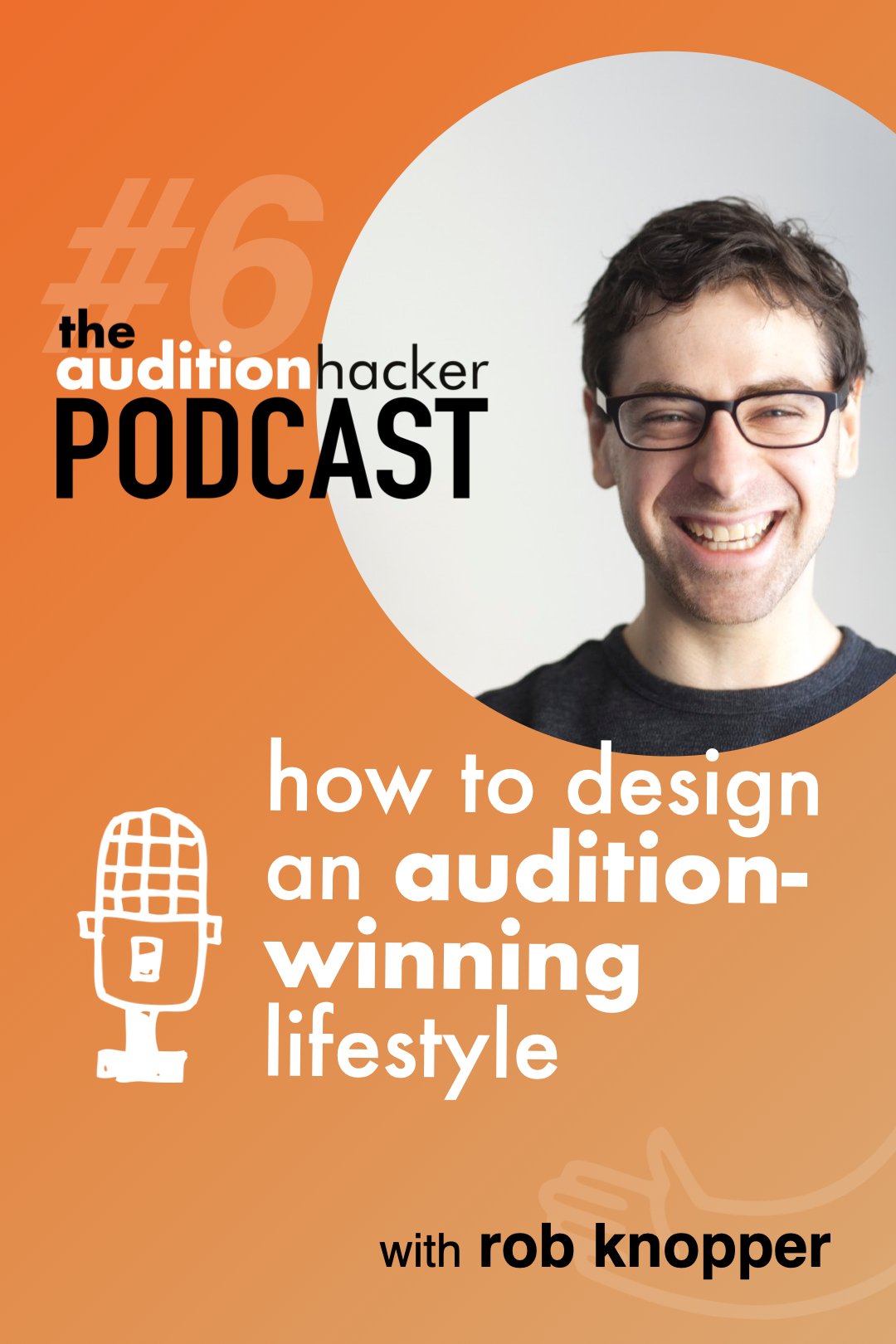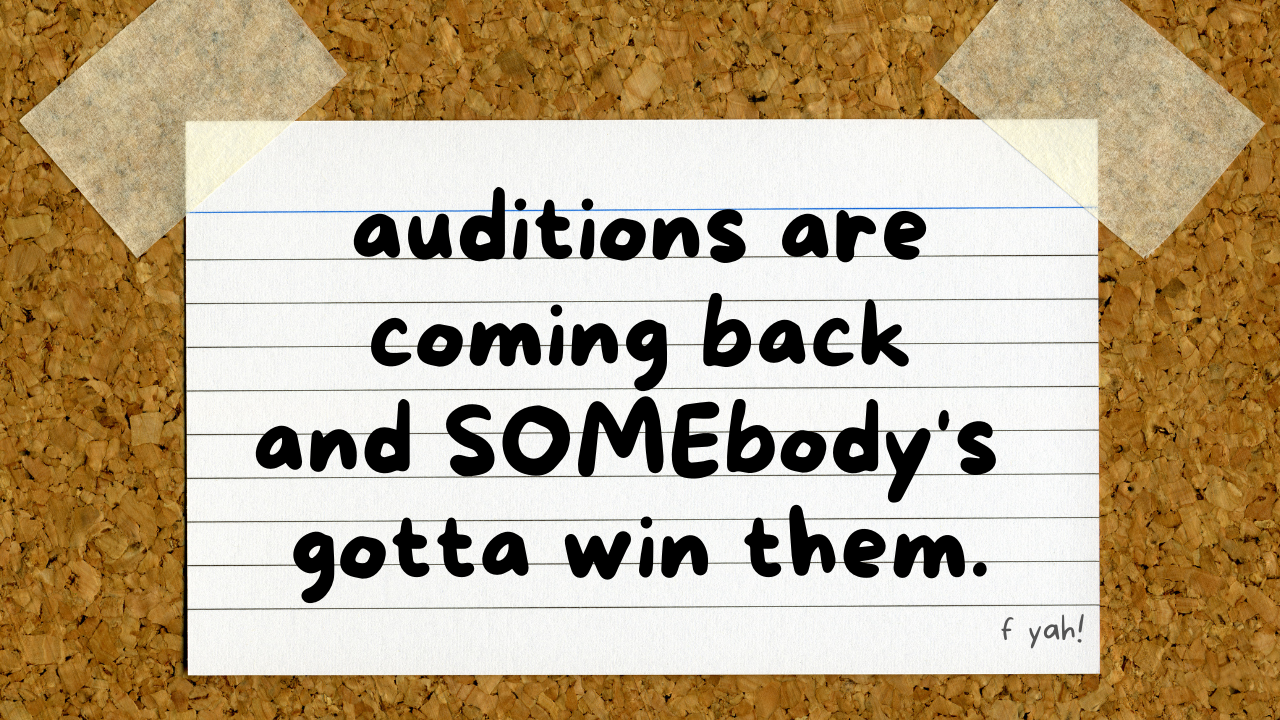photo: parker lee
when steven first won his job in 2016, i remember thinking, “who is that?”
i hadn’t heard his name in the grape vine of the percussion world.
i hadn’t heard about him getting to finals in recent auditions. that’s who would usually win an audition at the MET.
but i was at his audition. and he sounded amazing. so who was this guy?
well, there’s a reason i’d never heard of him. he came out of nowhere.
…he started his undergrad as a music education major.
...he only took 2 auditions before the MET. and he got cut in prelims in both of them.
…he was only 24 and still finishing college.
...and, to top it off, he had only recently recovered from a serious illness that kept him out of the practice room for 6 months.
so how did he win the MET?
i had to get some answers. so i brought steven in for a little chat.
in today's interview, steven breaks down the strategies that he used in his successful audition preparation process.
he explains why he took a conscious break from auditions during his first year of grad school.
he also explains his strategy of mental visualization, where for two weeks before the MET audition, he would lie in bed and visualize audition day, minute-by-minute.
i asked him about his audition journey and what he thinks tipped the scale in his MET audition.
without further ado, here’s steven.
rob: so. you grew up in a small town in northern michigan, you only took 3 auditions in your life, and you won the MET when you were 24. you must have practiced like crazy in your earlier years. how many hours a day did you practice in high school?
steven: ha. not really. probably like… 3 hours a day? i don’t know if that’s a normal amount to be practicing.
r: well, you won the MET, so whatever you did must be right. so then you started at northwestern for undergrad. how much did you practice there?
s: i just practiced like crazy. i would try to be the first one there every morning and the last one to leave. i was definitely the weakest person in my class, because all the other people had come from texas and big schools and had crazy snare drum chops. being from a smaller town, i didn’t have a huge orchestra experience growing up. i felt pretty behind in undergrad. but that was a good place to be in. you want to be the person who knows the least so you can learn the most.
actually, i didn’t even start as a performance major because didn’t think i had what it took to be a professional. i dealt with performance anxiety a lot in high school and i thought that would prevent me from having any sort of performance career.
r: what kind of performance anxiety did you have?
s: shaking on soft snare drum was always an issue, and i had some bad experiences with memory slips while trying to play marimba solos from memory.
it kept happening in college... i remember a couple studio classes where i’d get really angry because i couldn’t play excepts like i practiced. i’d lose my place in the excerpt and my hands were still shaky.
that’s why i was putting in 8 to 10 hours of practice a day. i knew i wanted to do music, i just didn’t know if i could ever get past these issues.
the only thing that eventually cured it is when i started playing mock auditions all the time.
r: so you finished northwestern. did you start grad school at MSM right away?
S: that’s a whole different story.
during my senior year, i got sick. as i was preparing for my senior recital, probably in february or march, i started having some stomach problems. this was a little over two years before my MET audition.
i saw a specialist, but the treatment didn’t work and i started getting tired and weaker and losing blood. i powered through for the recital, but my mom came to the recital and insisted on taking me home. we went straight to the hospital in traverse city and i was there for almost a month. i stopped eating because i was in there taking medicine all the time and at one point i was under 100 pounds. it was rough.
eventually i recovered and moved back to chicago, but i was out for like 6 months. that turned into a gap year where i played with chicago civic and took grad school auditions.
in the middle of that gap year, a few months before auditioning at MSM, i took the audition for utah symphony.
r: let’s talk about that. how did you prepare?
s: at that point i didn’t really know what i was doing. i decided to just choose a practice plan and stick to it. i started all the excerpts at half tempo, and every day i’d run an excerpt 5 times and then click up the tempo for the next day. i had a journal and everything.
r: how did you feel about that method of preparation?
s: it was ok, but i didn’t do any mock auditions, and i only did a little bit of self-recording on my voice memo app. i thought i was ready, but looking back i definitely wasn’t.
r: and? what happened?
s: they let me play the whole round, which was better than getting cut off, but there were some things that weren’t ready. i didn’t advance.
i was bummed. in the back of my mind, i had thought, “it's my first one and it’s gonna work out.” everyone thinks that. but it didn’t.
want to nail your next audition?
here’s the 5-part audition preparation method that i used to win a job in the MET orchestra.
the best part? it works for every instrument.
r: alright, so you take utah, then you move to new york and start MSM. what was your first audition there?
s: i took detroit at the end of my first year in grad.
r: ah, so it was a whole year later.
s: yep. actually, when i got to MSM, i made a conscious choice to take a break from auditions. i wanted to spend time wrapping my head around the concepts that i was learning for at least a while.
i was looking for a project to do during the first semester with my teacher, chris lamb. at the time, there were rumors that the MET would hold an audition, but it wasn’t announced. and chris used to be in the MET, too. so i found an old audition packet from a MET audition in 1996, we spent the semester going through that book.
it was so much fun because i was burned out on playing kije and porgy and i needed something different. i got so into it. the first opera i checked out was britten’s death in venice because it was on the list. i sat there and watched the whole thing. i thought i’d be bored but it was awesome.
after a semester doing opera excerpts, i decided to take detroit in the spring.
r: nice. how did you prepare differently for detroit than utah? did you use the same metronome strategy of increasing tempo every day?
s: nope, i wasn’t doing that anymore. this time i definitely did more mock auditions. and more self-recording.
actually, at christmas i asked for a bunch of amazon gift cards and i ended up buying all of the recording stuff that you outlined on your self-recording guide. it was everything i needed to start recording properly. that helped me hear myself better, which was a big step.
during this audition i was also a lot more focused on playing the instruments well rather than just working on the excerpts.
r: how did you feel about it?
s: i thought i played well. i recorded it and listened back and thought it was pretty good. but that was an assistant timpani audition and, at the time, that was one of my weakest instruments. the timpani tuning was a little off and that kind of hurt me. there were a couple of little things that i heard on the recording that i didn’t notice when i was in the room.
i got cut, but i understood why.
r: got it. alright. so that was the spring of your first year of grad, then you won the MET in october of your second year. how did you prepare for the MET audition?
s: well, like i mentioned before, technically i started preparing a year early. we found out in april that the MET audition would be in october. detroit was only 5 months before that.
the first thing i had to do was to make a tape for the recorded round. my goal was to make a tape so good that it would get through without question. i finished and turned it in the day before i left for the summer.
r: how did you prepare for that?
s: a LOT of self-recording. i spent a lot of time in the recording room testing out different mallets, setting up the microphone in different places, at different distances from the instrument, and at different heights. that took a long time. i probably spent a hundred hours on that tape.
i recorded different excerpts in different rooms, too. for instance, there was one room at MSM with higher ceilings and that’s the room i recorded the snare drum roll in. the instrument was too dry in the other room so i had to do it in a wetter room to help the sound.
it was july when i heard i got through. i was sitting at a picnic table on the tanglewood grounds eating lunch when i got the email.
r: so then you had august and september, and you won the job in october. what was your plan?
s: when i got the news that i advanced, i immediately planned out my next steps. first i had to learn the ones i didn’t know, which was only a few since i had learned so many excerpts the year before. that was an advantage because some of the other people i knew who also got their tapes through had to start from scratch with the whole list.
my goal was to have the whole book learned by the time i got back to nyc. my plan was to start playing mock auditions right away. so i did. i played a lot of mocks - as many as possible. every day for at least a month.
r: how did you organize your daily practice session?
s: i would have to do a mock late at night, because we couldn’t get the room until 10. i would get home at 11:30 or midnight after the mock, listen to the recording and write down what i needed to work on. then i would compare those notes to the comments from the two or three people who were listening. that would become my to-do list for the next day. so i'd work on that list all day the next day and then do another mock again the next night.
r: why do you think you did so well at the MET compared to detroit?
s: i definitely did more mock auditions. and more self-recording. i really refined my practice plan when i was making the tape to get past the recorded round. since i got through the round, i knew the level that the excerpts had to be at. so i just needed to recreate that for each excerpt.
but the one other thing that i only did for this audition was a lot of mental visualization.
r: mental visualization? what does that mean exactly?
s: i planned out a minute-by-minute schedule for how i would go through the day before the audition and audition day. and then every night before i went to sleep for a week or two i would lay in bed and visualize every single moment of those two days. it’s something i started doing when i auditioned and won a spot in chicago civic in 2013. i found that by anticipating what the day would look and feel like in my mind, the actual day felt familiar and easy to me. almost like being on autopilot.
here’s my schedule:
i knew that my call time on audition day was 1-2pm. so i planned to recreate my audition day plan the day before at the same exact time. i did everything the same. i packed up all my gear and took the elevator down to the lobby of the school. i sat in the lobby for 20 minutes to simulate being in an uber. i went back upstairs and had one of the freshmen meet me and carry my stuff down with me to another floor. that was funny because one of those guys ended up being one of the helpers at the real audition. i asked someone else to come at a certain time and tell me i advanced. i told them to give the normal spiel - “thank you all for coming,” etc.
i would go to sleep and visualize myself going through the schedule, waking up, brushing my teeth, going to eat, and having success. and then i did it all again for the semis. i wore the same clothes, i ate the same thing. i did the same routine.
r: wow, so you built this very structured, complete preparation process without even testing it out very many times. you just built this massive, super intense thing that was so great that it just happened to work after you tweaked it a couple times. nice.
s: yeah. i was so worried about not advancing past prelims again that i basically just tried to do as much as humanly possible.
r: you said, "screw this, i’m done getting cut.” and then you prepared your ass off. nice job! thanks for sharing your process, steven.
want to nail your next audition?
here’s the 5-part audition preparation method that i used to win a job in the MET orchestra.
the best part? it works for every instrument.














it's episode #8 of the auditionhacker podcast, and i'll go over my best methods for getting better feedback.